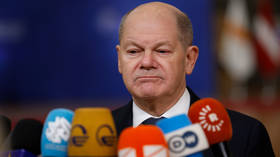Elon Musk says only far-right AfD party
'can save Germany'
Dec. 20 (UPI) -- U.S. billionaire Elon Musk on Friday said "only" the far-right Alternative for Germany party, currently running second in German polls with about 19% support nationwide, can "save" the country.
In a post on his wholly-owned social media platform X, the world's richest man gave the full-throated endorsement for the AfD while reposting a video by Naomi Seibt, a German right-wing social media influencer.
Germans are expected to vote in snap elections on Feb. 23. A conservative coalition headed by the Christian Democratic Union's Friedrich Merz is leading in the polls with about 32%.
"Only the AfD can save Germany," Musk wrote over Seibt's video, in which she blasts Merz for being "horrified by the idea" that Germany should follow the examples of Musk and Argentine President Javier Milei in espousing right-wing populism.
Related
Merz "staunchly rejects a pro-freedom approach and refuses any discussion with the AfD," Seibt wrote.
Friday's post is not the first time Musk has expressed support for the AfD, which is classified by German domestic intelligence authorities as a suspected right-wing extremist party.
In June, the close adviser to U.S. President-elect Donald Trump wrote that he did not view the AfD as an extremist organization. Those remarks came after reports circulated that AfD representatives met with extremist groups in which they discussed the mass expulsion or "remigration" of foreigners and Germans with migrant backgrounds.
The AfD quickly amplified Musk's statement on Friday.
"If you also want to save Germany, then join in and fill out the membership application right away," the party posted on X, while AfD leader Alice Weidel wrote in English to Musk, "You are absolutely right," and blasted what she called the "Soviet European Union" and labeled former conservative German Chancellor Angela Merkel a "socialist."
Musk's intervention into German politics elicited a cautious reaction from the lame-duck government of Chancellor Olaf Scholz, who told reporters in Berlin that while freedom of speech applies to billionaires such as him, that freedom "also means that you can say things that are not right and do not contain good political advice."
Harsher criticism came from other German political figures.
Matthias Miersch, secretary general of Scholz's Social Democrats, called the remarks "election interference," telling the news portal T-Online Musk's remarks are an "alarming signal" and declared, "We are clearly opposed to that. Germany needs neither foreign influences nor Trumpism. Stay out, Elon."
The head of the CDU's workers' wing, Dennis Radtke, told the German newspaper Handelsblatt it is "threatening, irritating and unacceptable that a key figure in the future U.S. government is interfering in the German election campaign," adding that Musk is becoming more and more of a "threat to democracy in the Western world" and has "converted X into a disinformation machine."
This is, of course, Satanic reversalism. Musk's X is the only large media platform where the truth is dared to be told. It is not available in the legacy media, nor in left-wing, or even centrist political parties where they hide the effects of Islamization in Europe and elsewhere. Only AfD will tell you the truth about Muslims in Germany.
Islamists aim to turn France into caliphate
– intel chief

The Islamist movement Muslim Brotherhood has been expanding its influence in France, acting behind the scenes to make the country a caliphate governed by Sharia law, according to the country’s top intelligence official.
Bertrand Chamoulaud, head of the National Directorate for Territorial Intelligence at the French Ministry of the Interior, made the remarks during an interview with Le Monde this week.
He said more than 100,000 worshippers attend mosques run by the Muslim Brotherhood, who spread their ideas through entrenchment and with a “very smooth” discourse rather than resorting to violence.
The movement is effectively using societal tensions to gradually infiltrate some social enterprises and civil society organizations, said Chamoulaud.
“This concerns us because their infiltration affects all sectors: sports, health, education, etc.,” he stressed.
One of their strategy tools is playing a victim role, Chamoulaud said, elaborating that every time a mosque is closed or a separatist imam is expelled, the Islamists denounce a so-called “Islamophobic state.”
The risk is that some moderate Muslims may be convinced by this victim discourse, the intel chief warned.
He cited as an example the non-profit organization Collective against Islamophobia in France (CCIF), which was created in 2003 with a mission to combat discrimination towards Muslims. Dissolved in 2020, the CCIF was repeatedly criticized over its use of the term Islamophobia, and was suspected of having Islamist links.
The CCIF’s ideas, such as the compulsory veil or the rejection of mixed-race groups, are now gradually becoming established in Belgium, Chamoulaud claimed.
The Society of the Muslim Brothers, better known as the Muslim Brotherhood, is a transnational Sunni Islamist organization founded in Egypt by an Islamic scholar in 1928. It advocates the application of Islamic law in all aspects of society, and is banned as a terrorist organization by many countries.
French President Emmanuel Macron has launched a crackdown on what he calls Islamist separatism and radical Islam in the country following deadly jihadist attacks in recent years by foreign and homegrown militants. The measures aim to limit foreign influence over Muslim institutions in France.
Nearly seven million Muslims live in France, around 10% of the population, according to data by France’s statistics agency. Islam is the country’s second-largest religion after Catholicism.
And the percentage will double every twenty or thirty years as immigration continues, as Muslim birthrates are more than twice what is needed to sustain their numbers, and as French birthrates are about half what is needed to sustain their numbers.
In many areas in France, Muslims already outnumber indigenous French people.
==============================================================
Germany is doomed because of this grave mistake

For decades, Germany was the envy of the world: a shining example of how a war-torn nation could rise from the ashes to become Europe’s economic powerhouse. This success was no accident. Germany’s prosperity rested on three key pillars: access to cheap Russian energy, unfettered free trade with the United States and other Western allies, and minimal military spending thanks to American security guarantees after the Cold War. These factors allowed Germany to build an unparalleled industrial economy, maintain a generous welfare state, and become a big player on the global markets.
But Germany’s decision to sever ties with Russia following the Ukraine escalation threatens to dismantle this carefully constructed foundation. By aligning itself entirely with the US-led NATO strategy against Moscow, Germany has unwittingly sealed its economic fate. The consequences are already visible, and the worst is yet to come. Germany is doomed because of this grave mistake.
The energy crisis: Germany’s Achilles heel
The German economy has always been a giant built on energy-intensive industries like chemicals, automobiles, and heavy manufacturing. These industries relied on one key advantage: affordable Russian natural gas. For decades, Berlin fostered a close energy relationship with Moscow, importing vast quantities of cheap gas through pipelines like Nord Stream. This mutually beneficial arrangement kept Germany’s factories humming and its export economy highly competitive.
That relationship is over. In response to Russia’s invasion of Ukraine, Germany abandoned Russian energy almost overnight, shutting down Nord Stream and scrambling for alternatives. The result? Soaring energy prices and a manufacturing crisis that is crippling German industry. Without cheap energy, the very sectors that made Germany an industrial giant – automotive, steel, and chemicals – are no longer globally competitive.
To make matters worse, Germany’s ideological commitment to a rapid green energy transition has only exacerbated the problem. While renewable energy has its merits, it is nowhere near ready to replace the reliable baseload energy that Russian gas provided. Germany’s decision to phase out nuclear energy – a reliable and carbon-free power source – further undermines its energy security. The result is an economy that is buckling under the weight of its own short-sighted policies.
Just like Canada, eh!
A world without free trade
The second pillar of Germany’s success was its reliance on free trade and global markets. As a leader in exports, Germany thrived in a world of low trade barriers and open markets. Its economic model depended on selling high-quality goods – cars, machinery, and chemicals – to countries like China and the US.
But the world is changing. The rise of protectionism, US-China decoupling, and increasing trade tensions have disrupted the global order that Germany relied on. Berlin’s economic dependence on China – its largest trading partner – has also become a liability as geopolitical tensions rise between Beijing and the West. Germany now finds itself in a precarious position, caught between its trade interests and its political alliances.
Even Germany’s vaunted trade relationship with the US is under strain. American policymakers are increasingly skeptical of European freeloading, particularly Germany’s refusal to shoulder a fair share of defense costs. Germany’s export-driven economy, which has long benefitted from free access to US markets, is vulnerable to rising trade barriers and growing American resentment.
The military dilemma
The third pillar of Germany’s post-war prosperity was its limited military spending. Protected by the American nuclear umbrella during the Cold War, Germany was free to focus its resources on economic development rather than defense. For decades, Berlin’s defense spending hovered below 2% of GDP – well below NATO’s target. This allowed Germany to invest heavily in infrastructure, social programs, and industrial innovation.
Now, Germany is being forced to change course. The Russia-Ukraine war has exposed Europe’s reliance on American military power, and Germany is under intense pressure to increase its defense budget. While this may please NATO allies, it will strain Germany’s already stretched finances. Berlin’s promise of a €100 billion defense fund is a stark departure from its post-war strategy of economic prioritization. The opportunity cost of this shift will be enormous, as funds that could have gone to rebuilding German industry or modernizing infrastructure are diverted to the military.
The doom of German exceptionalism
Germany’s decision to make Russia an enemy has turned one of its greatest assets – cheap energy – into a glaring weakness. Its over-reliance on global free trade is proving unsustainable in a more protectionist and fragmented world. And its newfound focus on military spending threatens to undermine the very social and economic stability that made it a model for others.
What’s worse, Germany’s leadership seems blind to the scale of the crisis. Chancellor Olaf Scholz’s government is doubling down on policies that will only accelerate the country’s decline: an overzealous green agenda, strained relations with China, and an uncritical alignment with US geopolitical goals. These decisions may earn Germany praise in Washington and Brussels, but they are condemning its people to a future of economic stagnation and declining living standards.
The writer neglects to mention the high costs of the Islamization of Germany. The extraordinary costs of social welfare spent on asylum seekers, and the need for a dramatic increase in spending on police and military just to deal with the growing criminal activity and the eventual civil war that must come out of it.
Germany’s mistake was not just turning against Russia – it was forgetting what made it successful in the first place. The road ahead will be long and painful, and unless Berlin rethinks its approach, the German economic miracle will become a cautionary tale of hubris and strategic folly.
===================================================================================





No comments:
Post a Comment